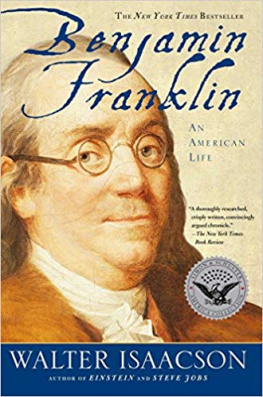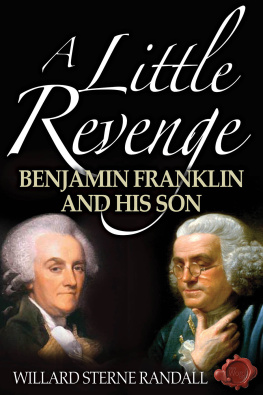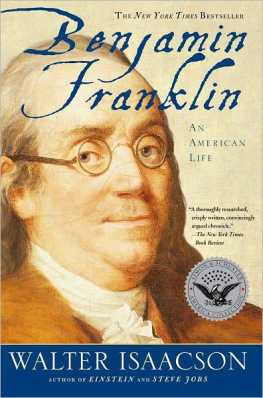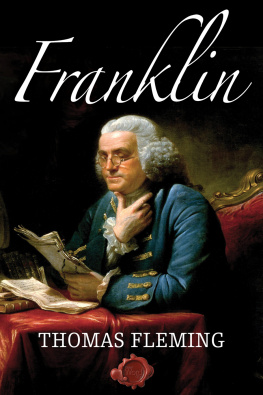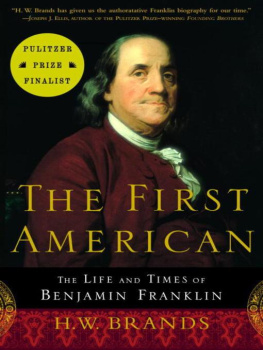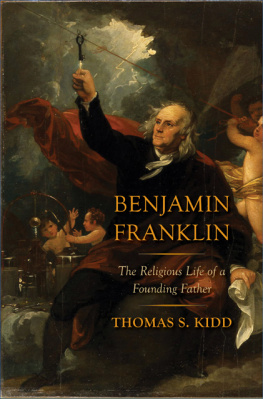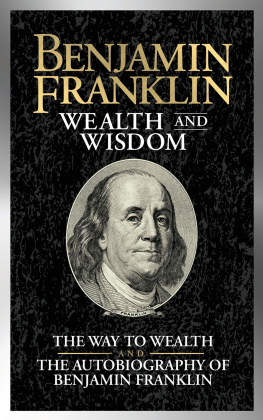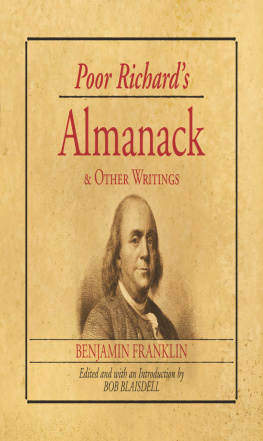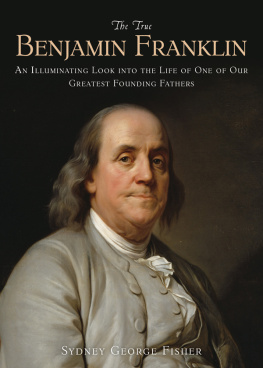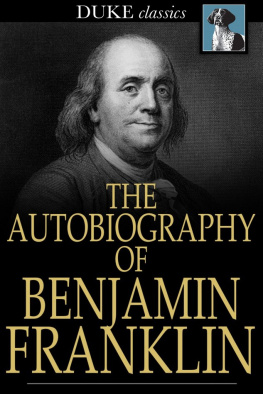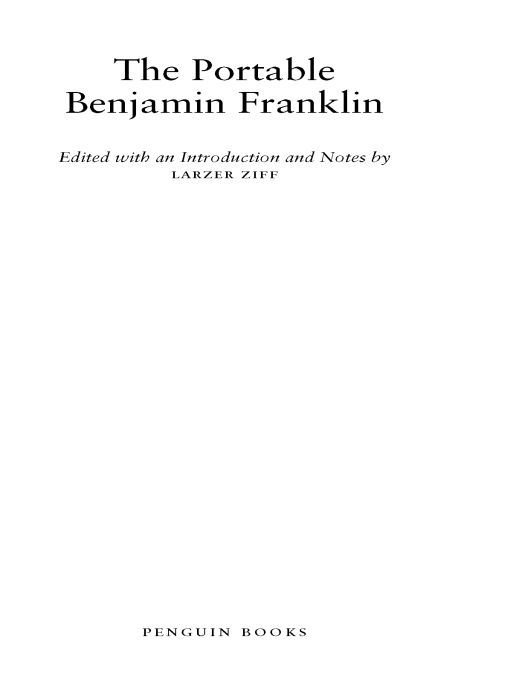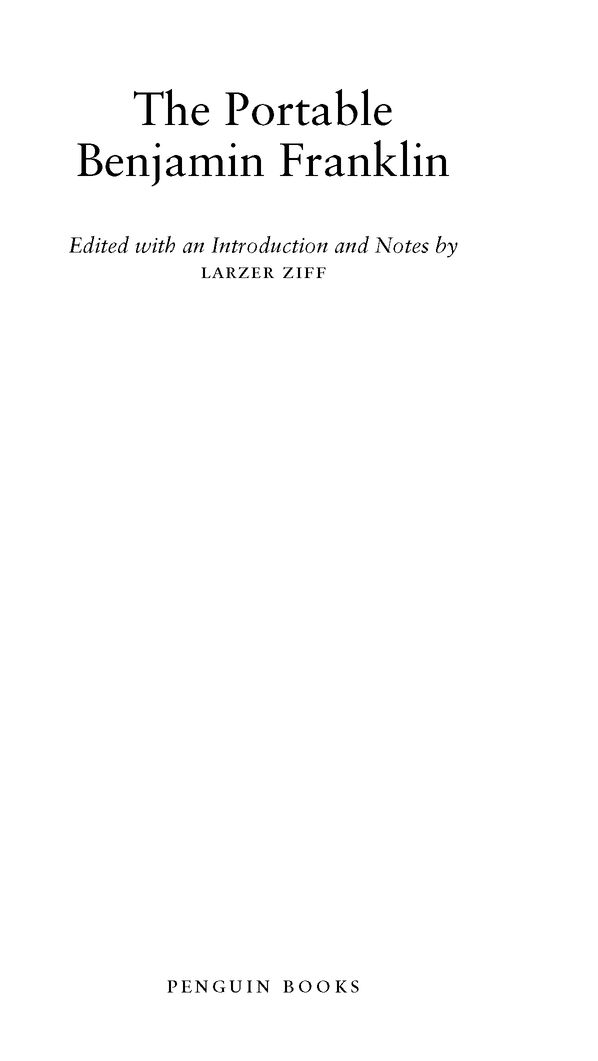Table of Contents
THE PORTABLE BENJAMIN FRANKLIN
BENJAMIN FRANKLIN (1706-1790) was the first American to achieve international celebrity. From the colonial period of his initial fame through to the twenty-first century, he has been regarded both at home and abroad as the one person who most clearly combines the many facets of the American character. He was the only person to sign all four major documents of the founding of the United Statesthe Declaration of Independence, the Constitution, the Treaty Alliance with France, and the Treaty of Peace with Englandand his participation in these momentous events, his rise to wealth from humble beginnings, his practical inventions, such as bifocals, his scientific discoveries, most prominently in the field of electricity, his myriad contributions to both civic improvement and the betterment of everyday life, his philanthropic schemes, his sagacity, and his shrewd (and often earthy) wit all remain freshly available in the lucid prose of his many writings.
LARZER ZIFF has written books on many aspects of American literary and cultural history, including the period of Benjamin Franklin. Research professor at the Johns Hopkins University, he is a winner of the Christian Gauss Award and a member of the American Academy of Arts and Sciences.
Introduction
In 1756, John Adams, then an ambitious twenty-one-year-old schoolmaster in Worcester, Massachusetts, pondered the impossibility of his ever achieving fame, located as he was in a modest profession in a provincial colonial town thousands of miles from the political and cultural institutions that nurtured the famous. He attempted to rationalize the matter by telling his diary that those who love fame descend to as mean tricks and artifices in pursuit of Honor as the Miser descends to in the pursuit of Gold. Yet fame, he knew, had already come to oneeven if only oneAmerican, Mr. Franklin of Phyladelphia, who, he noted, possessed a prodigious Genius cultivated with prodigious industry.
That same year the prodigious Franklin of Philadelphia, thirty years Adamss senior, was elected to the Royal Society of London, put a bill through the Pennsylvania Assembly that provided night watchmen and street lighting for Philadelphia, received an honorary masters degree from William and Mary College, toured the New York frontier to inspect military defenses against possible French attacks from Canada, and during a visit to Virginia on post office business met George Washington. It was a typical Franklin year, and yet so wide-ranging was his genius, and so conscientiously did he, as Adams surmised, cultivate it, that no years activities could actually be termed typical. Each year brought new experiments, new offices, new ventures. In the following year, for instance, Franklin departed for London as his colonys agent in the commencement of what would prove to be a long and distinguished diplomatic career. Yet also and always a man of business and a writer of force, he improved the time afforded by the long sea voyage to write a preface to the newest edition of his Poor Richard Improved. In it Father Abraham, a plain clean old Man with white Locks, advises his fellow villagers on the conduct of life by issuing a stream of proverbs to suit their daily activities. Later abstracted from the almanac and titled The Way to Wealth, the proverbs attained a worldwide popularity that continues to this day.
In Adamss lifetime, fame did, of course, come to him, albeit in a condition different from that of Franklins, affected as it was by the virulent abuses that partisan politics had invoked. As he looked back at his career from his retirement, Adams was alarmed by the abyss that had opened between the events he had gone through and their portrayal in the histories published by those too young to have participated in the nations founding. The sad truth that age seemed to bring home to him was that the price one paid for making history was that history then made one over in its image regardless of the actuality one had lived. The only defense against such misrepresentation, as Benjamin Rush, another founding father, suggested to him, was to write a history of your own times as far as you were an actor in them. Let them be published by your sons after your death. It will be more than a patent of nobility to your descendants to the end of time. And Adams likewise urged Rush to engage in the same task in order to defend his reputation against what he termed the corruption of tradition and consequently... the corruption of history. Writing privately for the information of their children, both men produced such manuscripts.
Benjamin Franklin had been dead for some twenty years when Adams and Rush corresponded on the matter of protecting themselves from the corruption of history. Like them he, too, had written a memoir initially addressed to his son (the term autobiography, not used in English before 1797, was to be applied to it by later editors). But there the resemblance ends in contrasts so striking as to overwhelm that slight similarity. Franklin was unconcerned with the corruption of history because his fame had never seriously been threatened. He did not aim at producing a patent of nobility for his descendants but at providing an account of his life that could assist them in conducting theirs.
Indeed, Franklin distrusted inherited honors. When in 1784 word reached him in Paris that disbanded officers of the Continental army had formed a hereditary Society of the CincinnatiWashington and Hamilton were to be its first presidentshe was scornful of what he saw as a flagrant breach of republican principles and an affront to the good sense of the American people. He admired the Chinese custom of ascending honor, he wrote his daughter, Sarah Bache, according to which when one attained the rank of mandarin his parents were immediately entitled to the same honors on the supposition that it must have been owing to the education and example they provided that their son had attained his rank. This ascending honor, he said, is therefore useful to the state because it encourages parents to give their children a good and virtuous education. But the descending honor to posterity who could have no share in obtaining it, is not only groundless and absurd, but often hurtful to that posterity, since it is apt to make them proud, disdaining to be employed in useful arts. He did not conceive of the history of his life as a patent of nobility for his descendants as his contemporaries saw theirs.
Franklins son William, whom he addressed at the start of the Autobiography, was born out of wedlock to an unknown mother and taken into the family of Benjamin and Deborah Franklin after their marriage. Rather than appearing to defend the honor of an established family as did the other memorialists, in the Autobiography Franklin is, in effect, creating a new kind of family. The account of their immediate forebears that he gives William is essentially a story of discontinuitiesancestral removal within England, parental removal from England to America, and his own removal from Boston to Philadelphiaa story that underlies the works demonstration that it is not a question of what or where you were at birth but what you make of lifes opportunities regardless of place of birth. With such an underlying theme, the


